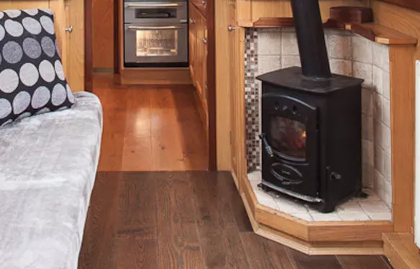THE NEW RULES CONCERNING what can be burnt on a wood burning stove are now in force.
With so many boats with such stoves, it is important that boaters check what is and what is not allowed, Keith Gudgin reports.
Result in fines
Using inappropriate or wet wood can damage stoves, release harmful pollutants that harm the environment and can now result in fines.
The ban was an effort to reduce emissions and promote greener alternatives, with Defra introducing the 'Ready to Burn' certification scheme, that allows consumers to easily identify woods that meet UK standards and are safe to burn as they must have moisture content below 20%.
 The best types include birch, ash, apple wood, oak and beech. Low moisture content makes these woods burn hotter, more efficiently and for longer, while producing less smoke and creosote.
The best types include birch, ash, apple wood, oak and beech. Low moisture content makes these woods burn hotter, more efficiently and for longer, while producing less smoke and creosote.
Many towns and cities are in smoke controlled areas, meaning households can only use authorised fuel or a Defra-exempt stove that can burn wood cleanly.
Authorities can issue fines starting at £175 for those who breach regulations, with penalties reaching up to £300. Using unauthorised fuel in a non Defra exempt appliance could result in fines of up to £1,000.
Woods you cannot burn
Wet or green wood
Energy is used to boil off the high water content of these woods rather than producing heat. This creates excessive smoke, releases harmful pollutants, and can be damaging for your stove and chimney.
Painted, treated or varnished wood
Toxic and corrosive chemicals are released which can be extremely hazardous to health when breathed in. As well as causing damage to your stove and chimney, you could also face fines for polluting.
MDF, chipboard or plywood
These are engineered woods that contain adhesives, resins, and chemicals which make them extremely unsafe to burn.
Driftwood
The presence of salt and minerals releases toxic chlorine gas when driftwood is burned and can damage metal stoves and chimneys, as well as health and environmental concerns.
Be aware
Boaters mooring in towns and cities where there are smoke control rules, should be aware of these new rules.
